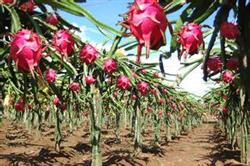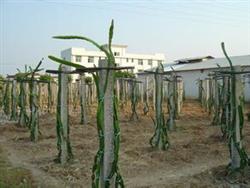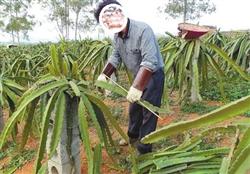How to cultivate dragon fruit with high yield

Dragon fruit, also known as red dragon fruit, cactus honey fruit, originated in Mexico and other Central American cactus triangular column plants. At present, it has been widely planted in Taiwan and mainland China. The dragon fruit is gorgeous in shape, rich in nutrition, rich in a variety of vitamins, amino acids and minerals. Eating its fruit has obvious effects such as lowering blood pressure, lowering blood lipids, diuresis, removing anger and so on. It is one of the rare nutrition and health care green foods in the market. 1. The growth habit of dragon fruit the best time for natural growth and germination of dragon fruit plant is from October to May of the following year, but cutting can be done all the year round. As long as the roots and buds planted in January are strong enough, they will blossom and bear fruit in July-August. Under the condition of normal temperature, it usually blossoms and bears fruit in the middle of April until the end of the production period in November. It can produce more than 8 batches of fruit a year, with a maximum of four batches, with an annual output of more than 2500 kg per mu. Temperature: pitaya is native to tropical and subtropical zones and is not cold-resistant. If the temperature is lower than 5 ℃ for a long time, the leaves will be frostbitten, but the growth will not be affected, so it is not suitable to be planted in high and cold mountainous areas and areas where frosts often occur. 2. Moisture: the dragon fruit is resistant to drought and humidity, and long-term stagnant water in the soil should be avoided in the process of planting, otherwise it is easy to have rotten roots and dead seedlings. Although there is no rain for a long time, dew will not die, but the growth period can not be short of water, keeping the soil moist and ventilated is beneficial to its growth. 3. Soil: the dragon fruit does not have high requirements for soil quality, no matter flat land, hillside land, paddy field and dry land, the sandy loam soil with good air permeability and rich organic matter is the most suitable. 3. Key points of dragon fruit cultivation techniques 1. Variety selection: according to the flesh color, dragon fruit has red skin and white meat, red skin and white meat, yellow skin and white meat and other varieties. Seedlings with stable characters, high self-fruiting branches and cuttings are better. Red skin and white meat are mainly planted in this area. 2. The whole border column: the width of the border is required to be 3m, the height of the border is 0.3m, and the depth of the ditch is 0.3m. The column should be made of 0.1m xO.1 m x 2.5m reinforced cement columns or stone strips for climbing vine branches. The stone column is pleasant soil 50cm, and the row distance between the two stone pillars is generally 2.0m x 3.0m. 3. Planting density and method: when planting, 4-8 seedlings were planted around the stone pillar, and the seedlings were slightly obliquely inserted into the soil about 5 cm away from the stone pillar to facilitate branch climbing; when planting, the ring trench was dug about 5 cm around the column. first sprinkle 150 grams of ternary compound fertilizer with soil or apply rotten human and animal feces, then cover the seedlings with thin soil and press them, and finally pour root water. 4. Support at the top of the pillar. At the top of the cement, two steel bars with a diameter of 0.8 cm and a length of 85 cm can be used to hook inward into ten brackets and fixed, and a waste bicycle tire is placed on the cross to support more branches for stretching, which is beneficial to blossom and bear fruit. 5. Water pipes: after planting, 3mure shall be watered once every 5 days, and then adjust the watering times according to the actual needs after survival. Regular diversion and irrigation after seedling growth, especially before topdressing, the whole garden should be irrigated to keep the soil moist. 6. Fertilizer tube: fertilizer can be applied after planting to make sure that the seedlings have survived. In the seedling stage, water and fertilizer is better, thin fertilizer is applied frequently, twice a month, and the amount of fertilizer is gradually increased; adult plants (especially fruiting plants) should apply heavy fertilizer in May every year, mainly phosphorus fertilizer, supplemented by nitrogen fertilizer, and phosphorus and potassium in the five days before each batch of fruit harvest. Generally speaking, the amount of fertilizer used each time should be controlled at 50kg of potassium sulfate per mu, 30kg of calcium, magnesium, phosphorus or excess calcium, and then sprinkled and fertilized on the border surface. During the flowering and fruiting period, special attention should be paid to the supply of fertilizer water, which is conducive to the large fruit and continuous flowering and fruiting. 7. Integrated control of diseases and insect pests: orchards have shallow roots and generally do not weed, but straw mulch can be used to inhibit the growth of weeds; diseases and insect pests rarely occur, generally do not need spraying, only in the seedling stage to prevent the damage caused by ants and snails, lime can be applied on the surface. 8. Harvest: when the flowers were pollinated successfully, the fruit chamber increased significantly on the 5th day, the fruit began to turn red on the 25th day, and could be harvested after 5 days when the fruit appeared glossy. It usually takes 35 days from flowering to fruit ripening, but the ripening period can be extended to about 40 days with the decrease of temperature in October. 9. Branch pruning: after the end of the production period, the fruiting branches of the current year should be cut off. The shady old branches and weak branches should also be cut off in time, so as to make the new branches more fat and lay a solid foundation for the next year's high yield. Pruning is suitable for pruning when the seedling height is 1.2 meters, the top of each plant is pinched, other auxiliary branches are all removed, and the new long branches are allowed to climb naturally after 1.2 meters. The shoots bearing buds were selected to retain 3 strong buds in different directions according to the strength, and 2 fruits were left in each branch 5 days after flowering, and the other buds were cut off. When the air root of the branch is still tender and weak, it is easy to be blown away from the stone pillar by strong wind and heavy rain to cause sagging and breaking, so the branch should be tied to the stone column with coarse cloth or plastic thread in time. Click to see more dragon fruit planting techniques
- Prev

Introduction to the planting experience and technology of dragon fruit
Meixian County is the famous hometown of golden pomelo, but the dragon fruit is rarely planted in this area, and the price is high in the market. The development of dragon fruit cultivation has great potential, which is conducive to change the planting structure and increase the income of farmers. A peasant household in Bingcun Town, Meixian County planted 5 mu of dragon fruit on a trial basis in 2003, and it grew very well.
- Next

What are the fertilizer characteristics of dragon fruit?
The pruning of fruit trees can adjust the structure of population and individual parts, improve the light utilization conditions, adjust the overall growth of fruit trees by using the dynamic balance law of aboveground and underground parts, and adjust the quantity, quality and rhythm of organ formation. Harmony between growth and fruiting, aging and rejuvenation, and the various parts of the tree, each...
Related
- Moge, come on! The staff of the peasant association in the producing area of cantaloupe were frightened when the crowd gathered.
- Causes and Solutions of low Fruit setting rate of Apple
- Symptoms and control measures of passion fruit virus disease
- Fruit growing lesson: how do apple orchards keep high yields?
- Can you build orchards in the mountains? What are the pros and cons?
- How to manage the coloring period of Crisson grape?
- This paper introduces the processing technology of two kinds of fig products.
- How much is a month for retired teachers in rural areas by 2020?
- How can strawberry planting increase sugar content? We should pay attention to management in many aspects.
- What are the cultivation techniques on how to improve the yield of golden fruit?

